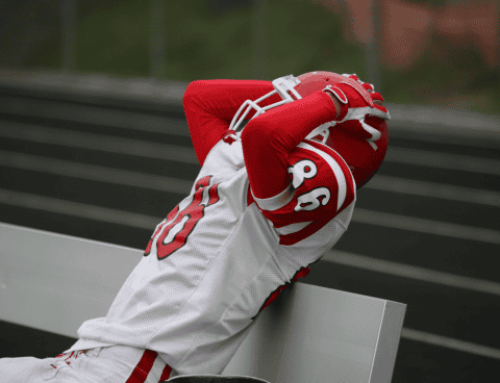Why is there a Shortage of Officials?
The matchup between Parkview and South Side promises to be one of the area’s best high-school football games of the season, and a full house is expected to be on hand under the Friday night lights. But on Wednesday, the Parkview athletic director gets a call asking that the game be moved to Saturday morning because there aren’t enough officials to go around on this particular Friday night.
Meanwhile, two high-school soccer teams battling for a division championship are preparing for their Saturday matchup, only to be notified on Friday afternoon that their game has been postponed because no officials are available. Three days later, an athletic director must decide which of two middle-school soccer games needs to be called off; there are officials available for only one of them. Scenarios like this are happening with increasing frequency as administrators deal with a shrinking pool of officials.
The Covid 19 pandemic has exacerbated the problem. Some officials chose not to work during the pandemic because of health/safety concerns, and some of them chose not to return at all.
But there are other factors in play as well, many of them long-standing. Some officials are finding that the increasing amounts of ridicule, abuse, and perhaps threats they have to deal with aren’t worth the $75 they earn for working a football game on Friday night. Consequently, an increasing number of officials are stepping away earlier than they might otherwise, while others simply age out. And the number of new officials entering the vocation does not equal the number of those stepping away. Consequently, administrators at all levels, from youth leagues up to and including the collegiate ranks, are finding it increasingly difficult to find enough officials to cover their games.
There is nothing new, of course, about officials being subject to criticism. But over the past couple of decades, the situation has gotten worse for a number of reasons.
Too many young athletes and their parents have an enhanced sense of entitlement
This is hardly a new problem, but it has gotten exponentially worse over the course of the author’s career as a sports journalist and official.
Increasingly, athletes are adopting an all-or-nothing attitude toward their sports. They want to make an elite travel team, start for the varsity as soon as they reach high school, and receive a college scholarship (the more scholarship offers, the better).
If a call goes against them or their team loses, it’s the official’s fault for preventing them from obtaining their objectives
We live in an era of specialization
Increasingly, athletes are specializing in one sport at younger ages. If he or she is a basketball player, they may be playing for an AAU team in the spring and summer instead of pursuing another sport. If their sport is baseball or softball, they may be playing for one travel team or another from the spring into the fall.
Devoting that much time to a single sport requires a commitment of time and energy, but also dollars if a substantial amount of travel is involved. Athletes and their parents see a scholarship as a return on investment, a return they often feel entitled to.
There is a declining emphasis on sportsmanship
Theoretically, high school sports are supposed to be an extension of the educational process. Some institutions remain true to that premise. Some do not. One common problem is that new officials can become discouraged, and some leave the vocation before their careers really get started.
Patrick Gebhart is an assistant executive director with the Pennsylvania Interscholastic Athletic Association. His responsibilities include dealing with officiating issues. One of his challenges involves retaining officials already on the rolls. “All the national studies have shown that if we can get an official to their third year, we have a chance of keeping them for an extended period of time,” he said. “Officials who were interviewed after leaving the avocation during their first two years expressed that abuse by coaches, players, and fans was the primary reason they left officiating.”
In the past three years, the PIAA has lost eight percent of its registered officials for one reason or another; replenishing the pool of officiating talent won’t happen overnight. One place to look for new officials is among the ranks of high school and college student-athletes, individuals who are passionate about sports but have hit their ceiling as players. The high-school linebacker who is too small or slow to play in college might consider officiating as a way to stay actively involved in sports.
Some high schools and colleges offer officiating classes to their students.
There was a time not so long ago when there was an ample supply of officials to go around. That’s not the case today, and the task of recruiting and retaining officials is an ongoing effort. And that effort includes insisting that officials be treated with the respect they deserve.
Rick Woelfel resides near Philadelphia and started officiating as a teenager. He recently retired after working basketball, baseball, softball, and football 50 years.
RECOMMENDED FOR YOU
MOST POPULAR
Why is there a Shortage of Officials?
The matchup between Parkview and South Side promises to be one of the area’s best high-school football games of the season, and a full house is expected to be on hand under the Friday night lights. But on Wednesday, the Parkview athletic director gets a call asking that the game be moved to Saturday morning because there aren’t enough officials to go around on this particular Friday night.
Meanwhile, two high-school soccer teams battling for a division championship are preparing for their Saturday matchup, only to be notified on Friday afternoon that their game has been postponed because no officials are available. Three days later, an athletic director must decide which of two middle-school soccer games needs to be called off; there are officials available for only one of them. Scenarios like this are happening with increasing frequency as administrators deal with a shrinking pool of officials.
The Covid 19 pandemic has exacerbated the problem. Some officials chose not to work during the pandemic because of health/safety concerns, and some of them chose not to return at all.
But there are other factors in play as well, many of them long-standing. Some officials are finding that the increasing amounts of ridicule, abuse, and perhaps threats they have to deal with aren’t worth the $75 they earn for working a football game on Friday night. Consequently, an increasing number of officials are stepping away earlier than they might otherwise, while others simply age out. And the number of new officials entering the vocation does not equal the number of those stepping away. Consequently, administrators at all levels, from youth leagues up to and including the collegiate ranks, are finding it increasingly difficult to find enough officials to cover their games.
There is nothing new, of course, about officials being subject to criticism. But over the past couple of decades, the situation has gotten worse for a number of reasons.
Too many young athletes and their parents have an enhanced sense of entitlement
This is hardly a new problem, but it has gotten exponentially worse over the course of the author’s career as a sports journalist and official.
Increasingly, athletes are adopting an all-or-nothing attitude toward their sports. They want to make an elite travel team, start for the varsity as soon as they reach high school, and receive a college scholarship (the more scholarship offers, the better).
If a call goes against them or their team loses, it’s the official’s fault for preventing them from obtaining their objectives
We live in an era of specialization
Increasingly, athletes are specializing in one sport at younger ages. If he or she is a basketball player, they may be playing for an AAU team in the spring and summer instead of pursuing another sport. If their sport is baseball or softball, they may be playing for one travel team or another from the spring into the fall.
Devoting that much time to a single sport requires a commitment of time and energy, but also dollars if a substantial amount of travel is involved. Athletes and their parents see a scholarship as a return on investment, a return they often feel entitled to.
There is a declining emphasis on sportsmanship
Theoretically, high school sports are supposed to be an extension of the educational process. Some institutions remain true to that premise. Some do not. One common problem is that new officials can become discouraged, and some leave the vocation before their careers really get started.
Patrick Gebhart is an assistant executive director with the Pennsylvania Interscholastic Athletic Association. His responsibilities include dealing with officiating issues. One of his challenges involves retaining officials already on the rolls. “All the national studies have shown that if we can get an official to their third year, we have a chance of keeping them for an extended period of time,” he said. “Officials who were interviewed after leaving the avocation during their first two years expressed that abuse by coaches, players, and fans was the primary reason they left officiating.”
In the past three years, the PIAA has lost eight percent of its registered officials for one reason or another; replenishing the pool of officiating talent won’t happen overnight. One place to look for new officials is among the ranks of high school and college student-athletes, individuals who are passionate about sports but have hit their ceiling as players. The high-school linebacker who is too small or slow to play in college might consider officiating as a way to stay actively involved in sports.
Some high schools and colleges offer officiating classes to their students.
There was a time not so long ago when there was an ample supply of officials to go around. That’s not the case today, and the task of recruiting and retaining officials is an ongoing effort. And that effort includes insisting that officials be treated with the respect they deserve.
Rick Woelfel resides near Philadelphia and started officiating as a teenager. He recently retired after working basketball, baseball, softball, and football 50 years.











